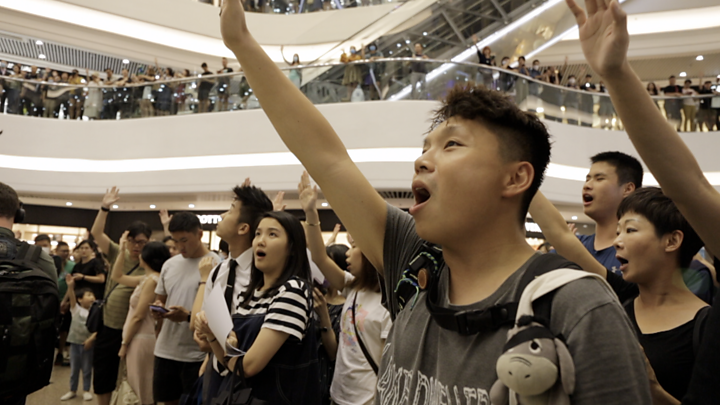How Hong Kong got a new protest song
The protesters in Hong Kong are embracing a new tune.
Glory to Hong Kong, a four-verse song with Cantonese lyrics that references “tears on our land” and “democracy and liberty”, has been picked up in recent weeks by thousands of people gathering in shopping malls, football match and parks.
It was written only recently by a local musician in his mid-20s, who only wishes to be identified as “Thomas”.
He told BBC News Chinese he hoped the song would “unite Hong Kongers and boost public morale”.
“I came up with the melody… in early August. And from there I wrote the rest of the song,” he said.
Despite the government scrapping the extradition bill which sparked the initial unrest, the protestors are continuing their action, and have expanded their demands to include full democracy and an investigation into alleged police abuses.
Thomas told the BBC “people were growing tired and weary” after three months of protests, but that there’s “now new energy in the movement and protesters seem to have been re-energised”.
Where did the song come from?
Singing has played a large part in the protests since they began in June. The Christian hymn Sing Hallelujah to the Lord and Do You Hear the People Sing? from hit Broadway musical Les Miserables have proved particularly popular.
Lots of people have also been writing and sharing their own protest compositions, or sharing their ideas for possible lyrics.
A few weeks ago, Thomas posted the first version of Glory to Hong Kong – sometimes translated as Glory be to thee, Hong Kong – on LIHKG, a local Reddit-like forum (link in Cantonese).
He said he felt the need for a song that captured the energy of the protesters, so composed the marching-style tune.
“In the Umbrella Movement [the 2014 protests] people sang pop songs and at the time I already felt that that style and rhythm didn’t really capture the passion and excitement of protests,” he said.
“I wanted to write a song showing Hong Kong’s fight for democracy and freedom.”
And, after a few refinements to the lyrics, it became a viral hit online and on the streets.
End of Youtube post by Black Blorchestra
“We needed a song to connect,” said a user on Twitter. “And this was the answer to that.”
Various video versions are now circulating, some depicting Hong Kong’s landscape, its Bauhinia flower symbol or protesters placing their hands over their hearts.
Earlier this week, one video was even released of a full orchestra and choir performing the song, all wearing the gas masks worn by protesters to protect against tear gas, and performing amid clouds of smoke. It drew more than a million views on YouTube.
And at a football match on Tuesday, thousands of protesters booed the Chinese national anthem before the start of the game and instead sang out Glory to Hong Kong.
Protesters at one mass singing event this week told the BBC that they identified closely with Glory to Hong Kong.
“I finally understand why people from other countries cry when singing their national anthem,” one said. “I feel love and honour for Hong Kong.”
Controversially, some have even said they hoped it would become a “national anthem”. One person told the BBC the song represented the voices of “all Hong Kongers”.
But pro-Beijing protesters countered that sentiment on Thursday, as they staged a flashmob-style event to sing the Chinese national anthem at a mall in the Central district.
A video showed people flying Chinese flags and trying to drown out the anti-government songs with their own.
#NOW – Pro-Beijing protesters flies Chinese flags in IFC, Central. This followed an online to sing the national anthem at 1pm, to counter the "Glory to Hong Kong" singings.#antielab pic.twitter.com/I18fXMG2rK
End of Twitter post by @sumlokkei
There’s no official English translation of Glory to Hong Kong. Thomas says no-one has yet agreed on one.
But that has not stopped translations such as this one, from being circulated widely among social media users on Twitter.
Glory be to thee, Hong Kong! pic.twitter.com/A7j0xGhX6R
End of Twitter post by @sandorpetofi1
“I’m happy that my anthem has been accepted by the public and I feel a lot of emotion when I hear my work being sung by people of all ages,” Thomas said.
“But I hope that people will not just focus on singing but do more to spread the message,” he added.
All the background you need on the Hong Kong protests
Reporting by the BBC’s Grace Tsoi in Hong Kong.
Source: Read Full Article



